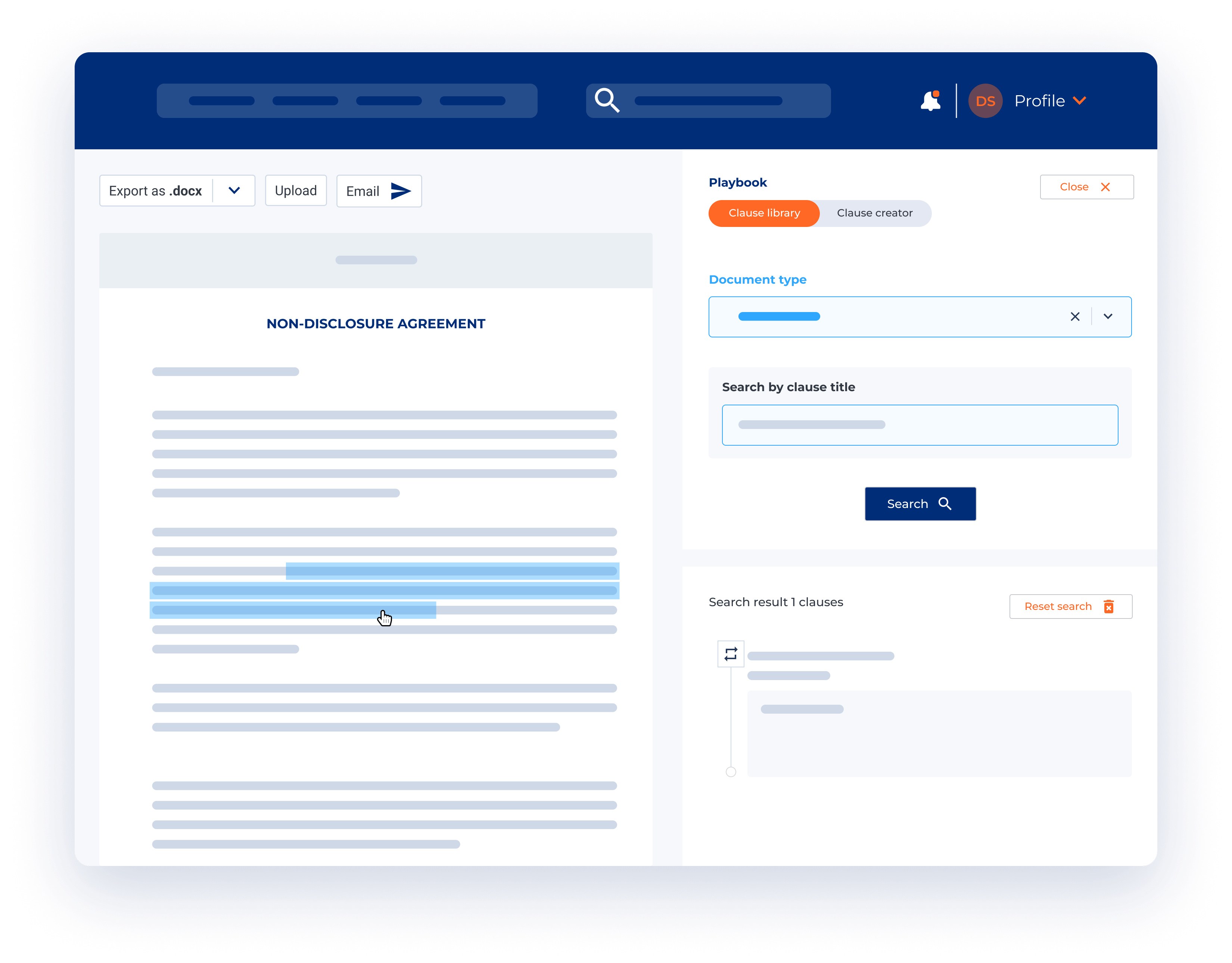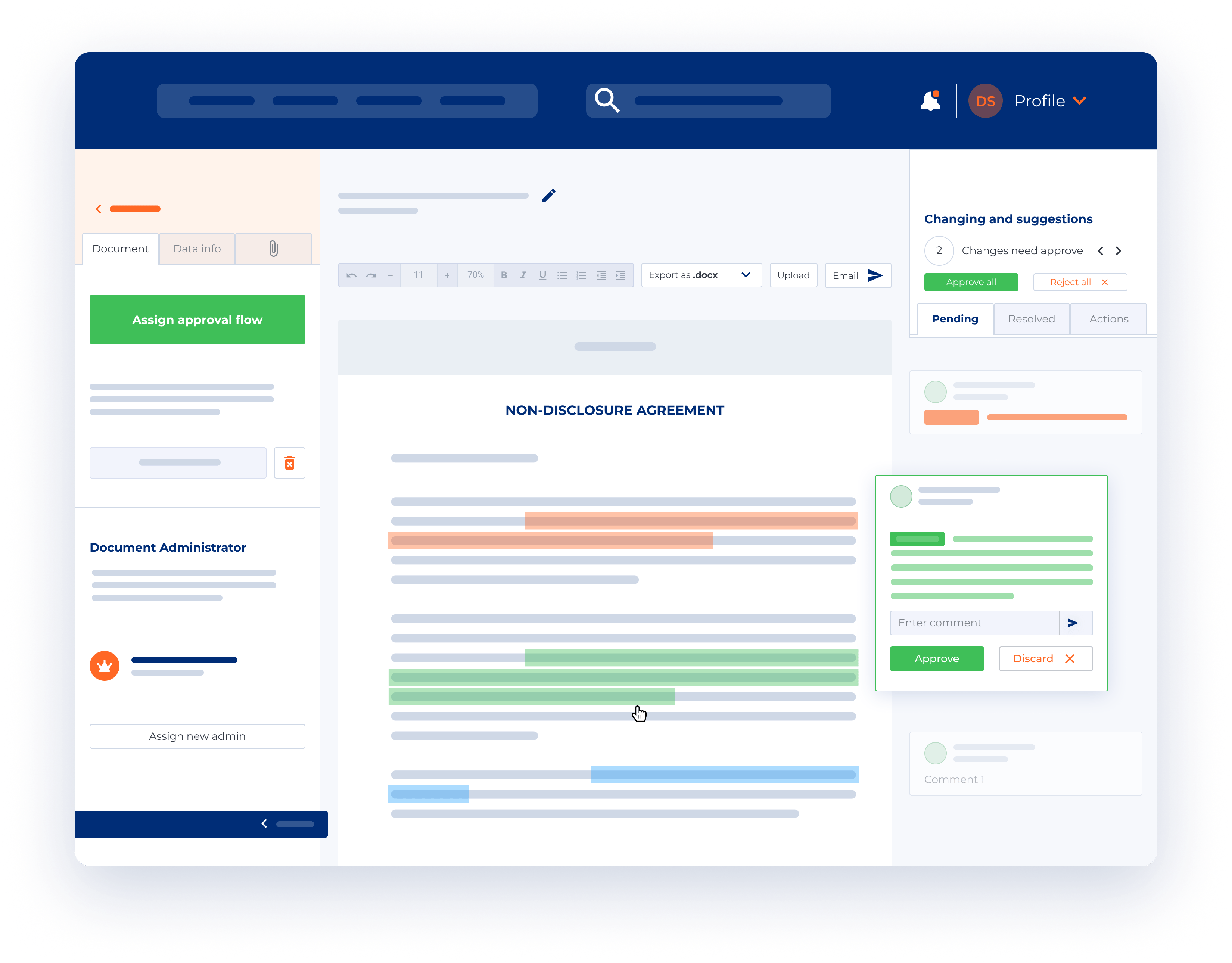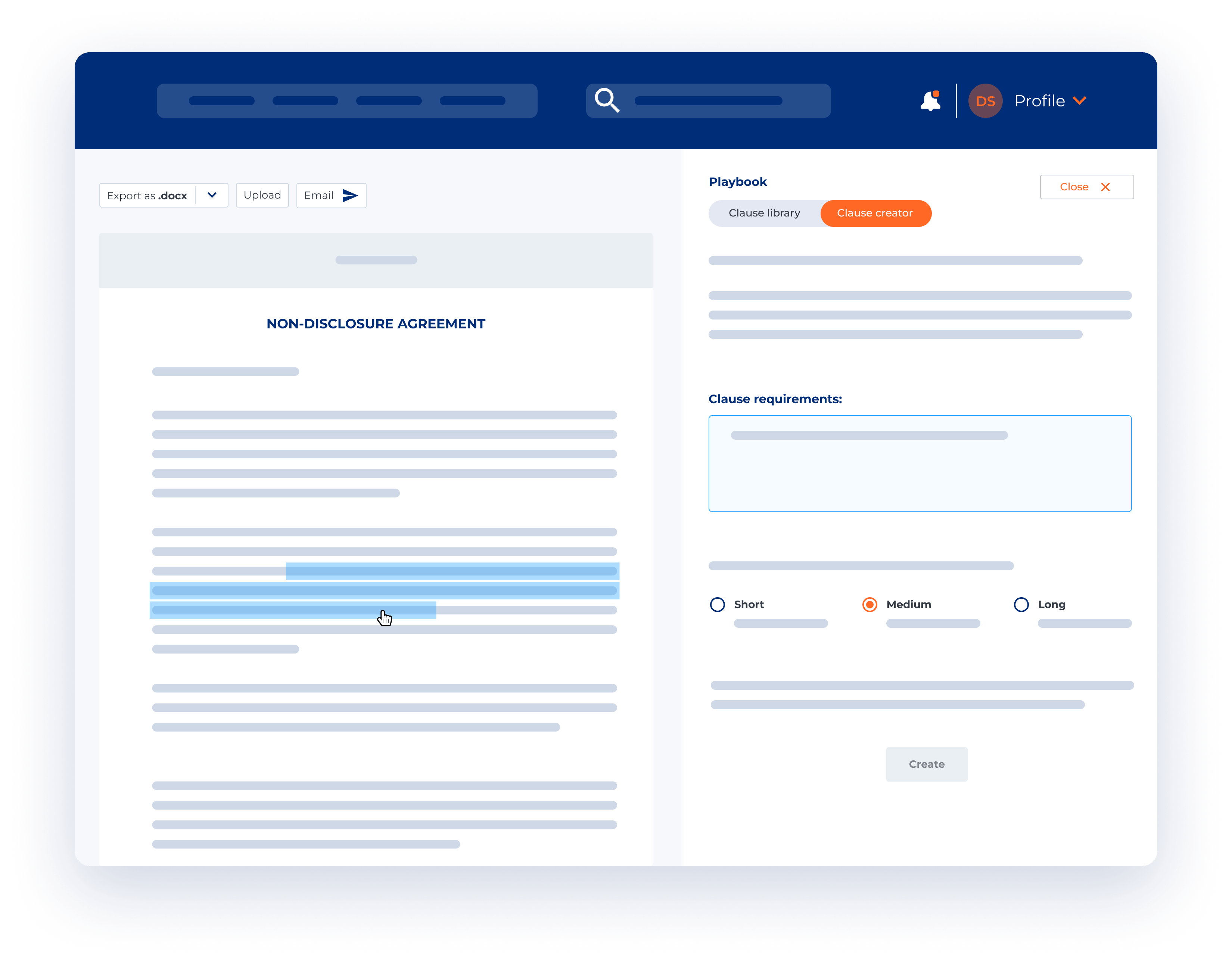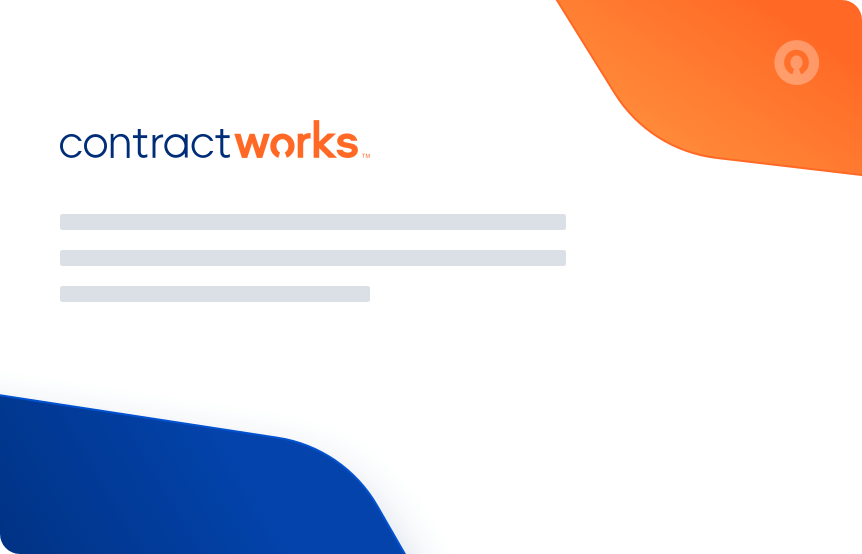In seconds, create contract clauses smarter and swifter with GPT-3 AI (technology behind ChatGPT)
Scale your company's contracting without the huge price tag. Small teams that lacked a clause library for faster contract review can have it instantly with Clause Creator AI. Available for all ContractWorks users, and not in beta.
Transforming contract management for companies worldwide





Faster Contract Negotiations
Capitalize on artificial intelligence to scale your contracting


.webp)
Faster Contract Negotiations
Capitalize on artificial intelligence to scale your contracting
Create
Draft new contract clauses in under 5 seconds without starting from scratch every time and without re-learning complicated software.
Accelerate
Foster collaboration by removing bottlenecks that occur due to contract review, manually writing contract clauses, or copy-pasting clauses from existing contracts.
Simplify
Convert baffling legalese into simple English so that non-legal teams can make better decisions supported by knowledge of what’s contained in contracts.
Legal Tech for Fast and Easy Clause Creation
Enjoy immediate value now by turning to the new ContractWorks GPT-3 AI feature to create legally-enforceable clauses in seconds.
AI for Legal and Business Teams
Streamline legal services with ContractWorks
.webp)
.webp)

AI for Legal and Business Teams
Streamline legal services with ContractWorks
Greater Delegation
Spend less time hashing out contract specifics and spend more time on higher priorities. Enable business teams to manage contracting without having to turn to Legal at every corner.
Increased Visibility
Put teams in a position to succeed by equipping them with the tools they need to sift through contract data, construct reports, and make decisions. Ensure transparency with the help of AI features.
Better Productivity
Boost productivity instantly by building a robust library of ready-to-use clauses. Allow Simplify and Clause Creator to cut down on errors, bottlenecks, and requests to translate legalese.
Features
Explore more ContractWorks features
Search & Review Powered By AI
Quickly find specific language and clauses with OCR and advanced search features.

Know What to Look For
The Buyer's Guide to Contract Management Software
There are hundreds of contract management solutions on the market. Download our guide to quickly determine which one is the best fit for your needs.
Download See All Resources
FAQs
What is ChatGPT?


ChatGPT is an interactive language model created by the tech startup OpenAI. Built using a complex machine learning algorithm, It produces human-like text in response to user queries.
What is GPT-3?


GPT-3 is a language model developed by OpenAI, and it is effectively the engine that powers ChatGPT.
Both models are the same up to a certain point. However, GPT-3 is the more powerful model as it contains more machine learning data, which allows it to provide better results. In contract, ChatGPT is the more user-friendly and intuitive model as it was adjusted to become a chat application using additional data.
In March 2023, OpenAI launched GPT-4, which is an even more powerful model compared to GPT-3.
How is GPT-4 different from GPT-3?


According to OpenAI, GPT-4 is able to process up to 25,000 words. Compared to GPT-3, this makes GPT-4 approximately ~12–16 times more powerful in terms of the number of words it can process. As for ChatGPT, GPT-4’s word limit is 8 times larger.
GPT-4 also generates more accurate results due to its larger amount of training data and greater number of parameters. Whereas GPT-3 was trained using 17 gigabytes of data, GPT-4 was fed 45 gigabytes of data. OpenAI hasn’t publicly released GPT-4’s technical data, but some estimates place GPT-4 at around 1 trillion parameters, making it over 5 times larger than GPT-3 (which has 175 billion parameters).
The other key change is that GPT-4 is multimodal. This means that it can accept both image and text inputs. GPT-3 and ChatGPT are both only able to support text.
Does the law allow using ChatGPT for clause drafting?


At the moment, very few countries restrict the use of ChatGPT.
Of the countries that have restricted ChatGPT at some point, Italy is probably the most notable due to Europe’s GDPR and strict privacy laws. In April 2023, Italy banned ChatGPT citing data privacy concerns.
However, Italy has since lifted the ban after OpenAI made ChatGPT’s privacy policy accessible to people before registering and launched a new tool that verified a user’s age (both of these were concerns voiced by Italy, and they were cited as reasons for Italy banning the tool).
Are there data privacy concerns with ChatGPT?


OpenAI is continuing to launch new features that strengthen ChatGPT’s ability to process data without violating data security or data privacy laws. For example, OpenAI stated they will provide European Union users a special form that gives them the right to object to using their personal data. As time passes, more measures will be implemented to ensure data privacy, as well as compliance with local law.
For now, until OpenAI confirms it can guarantee data privacy, as a rule of thumb, it is recommended to avoid providing any sensitive or privileged information to ChatGPT as most data is used to further train the model.
Are there any limitations to ChatGPT in legal?


In addition to data privacy concerns, some of the limitations of ChatGPT include its lack of current data, tendency to provide overly long or wordy answers, and inability to consistently perceive nuanced language. Prompts should be kept short and concise, as the longer the prompt, the greater the chance of misunderstandings.
These limitations can be easily mitigated with human oversight. That’s why it’s always recommended to have somebody perform a bit of quality control to ensure that content provided by ChatGPT is correct.
How can I use ChatGPT in legal operations?


This depends on your needs and goals. At ContractWorks, we’ve deployed GPT-3 as a generative AI that can create contract clauses for potential use, as well as a language simplification tool.
You can also use ChatGPT as a method to speed up basic legal research. For instance, you can prompt ChatGPT to provide a basic explanation about Canada’s PIPEDA law, and ChatGPT will reply with a general explanation.
As further evidence that ChatGPT is being used to drive research, Microsoft and Google are both implementing AI-powered search engines.
For more possibilities, check out our guide “How to Train ChatGPT to Become Your Legal Assistant.”
How is AI used in legal?


In addition to generative AI features powered by ChatGPT, legal AI can be used for several other legal operations tasks.
Due to its effective character limit, ChatGPT is limited to provided single clauses. However, a simpler type of AI can be used in legal tech to produce initial contract drafts using automated templates.
Law firms, lawyers, and legal professionals also use AI chatbots to reply to basic questions and provide simple instructions. For now, most of these chatbots don’t leverage GPT-3. Instead, they are built using decision trees that are designed using frequently asked questions. Once they hit the end of a potential route, they will either ask if you want to return to the beginning of the tree, or if you want to be forwarded to a real person.
Can an AI give legal advice?


The current answer is “no.” Or at least, any legal advice provided by an artificial intelligence should be taken with a grain of salt and run by a human lawyer for confirmation.
This is partly because AI tools like ChatGPT still have difficulties processing subtleties and nuances. Another limiting factor is that at the moment, ChatGPT only contains data up to 2021. It doesn’t know any laws and regulations that have been enacted since 2021, which is essential for legal research into current topics.
In other words, as far as ChatGPT knows, Roe v. Wade (1973) is still in effect. This is because the Supreme Court case ruling on Dobbs v. Jackson wasn’t released until 2022. As a result, getting legal advice from AI that doesn’t have up-to-date data is a major legal risk.
In ChatGPT’s own words, AI is best used to assist with legal research, document analysis, and other generative work. It should not be used as legal counsel or for giving legal services.
Can AI be a legal entity?


Theoretically, nothing stops a country from enacting a law that designates a certain type of AI as being a legal entity.
For now, governments, lawyers, and researchers are debating as to whether artificial intelligence should be granted some degree of legal status. It’s unlikely that there will be any decision in the near future.
What is AI for legal contract review?


Artificial intelligence for contract review and analysis is described as being the process of using software to read, understand, and extract information from contracts. AI can then provide assistance in identifying important clauses, obligations, risks, and opportunities.
Artificial intelligence can also be used to compare contracts with your current corporate standards, contracting best practices, and general benchmarks.
Affordable Contract Management Software Pricing
ContractWorks offers low, transparent pricing at three different levels, affordable for businesses of all sizes.
Includes unlimited users, 2,500 documents, and 5 electronic signature licenses.
Includes unlimited users, 10,000 documents, and 10 electronic signature licenses.
Includes drafting, redlining, and workflows for companies looking to scale to a full CLM.







